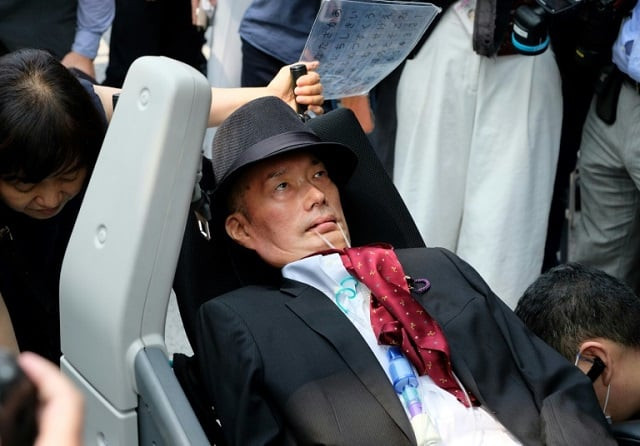Lawmakers with serious disabilities take seats in Japan parliament
The lawmakers and disabled rights activists say this effectively penalises those with disabilities who want to work

Japanese lawmaker Yasuhiko Funago's election has highlighted the fact Japan only pays for care if the disabled person is not working. PHOTO: AFP
Yasuhiko Funago and Eiko Kimura won seats last month in the country's upper house election and their use of special reclining wheelchairs has required modifications to the Japanese parliament.
The pair both rely on caretakers for support, and their election has highlighted the fact that Japan only pays for such care if the disabled person is not working.
'I don't have words': Boss of torched Japan animation studio mourns bright, young staff
The lawmakers and disabled rights activists say this effectively penalises those with disabilities who want to work.
Japan's upper house has agreed to pay for Funago and Kimura's caretakers, but the new lawmakers want the rules changed more broadly.
"It will take a long time to change the system, but we will work hard in parliament to correct this big problem," Kimura told cheering supporters outside the Diet building as the new parliament session began.
"I am surprised that so many people came here," added Funago, speaking with help from his caretaker.
"I will do my best to live up to everyone's expectations."
A special temporary ramp allowed the lawmakers to ceremonially enter through the main gate of the Diet, opened only on these special days.
But to reach the main chamber, they had to re-enter through a back door to access the only elevator.
Diet officials have said they will do their best to accommodate the new lawmakers but warned there were limits.
"It's technically difficult to install a slope and lift connecting the main entrance to the chamber... because the building is very old, built when the word 'barrier-free' was unknown," a parliament official said.
But other accommodations have been made, including removing seats to make space for the special reclined wheelchairs used by the lawmakers and changing the rules to allow their caretakers to be present during sessions.
The renovations have so far cost 880,000 yen ($8,100).
The two lawmakers, who won seats on the ticket of a newly formed small opposition party, are both largely paralysed from the neck down.
Funago, 61, is the first person with ALS to be elected to the national parliament. He cannot speak and communicates by blinking to his caretaker or using a computer system operated by his mouth.
Kimura, 54, is paralysed from the neck down except for her right hand.
Japan's cabinet office says there are 9.63 million people in the country with physical, mental, or intellectual disabilities.
But while the country is preparing to host the Paralympics next year, some activists say people with disabilities remain marginalised in Japan and have hailed Funago and Kimura's election as a win for representation and visibility of the community.
Japan's Abe keeps upper house grip but no 'supermajority'
"I want them to make a breakthrough. A vast majority of people don't know what seriously disabled people are like. I hope we can start with letting people know," said the 51-year-old Yumiko Watanabe, who is paralysed from the chest down.
She would like to work and hopes to see the lawmakers push for a more inclusive country.
"I want people to know that those of us with serious disabilities are not bed-ridden if care is provided."



















COMMENTS
Comments are moderated and generally will be posted if they are on-topic and not abusive.
For more information, please see our Comments FAQ